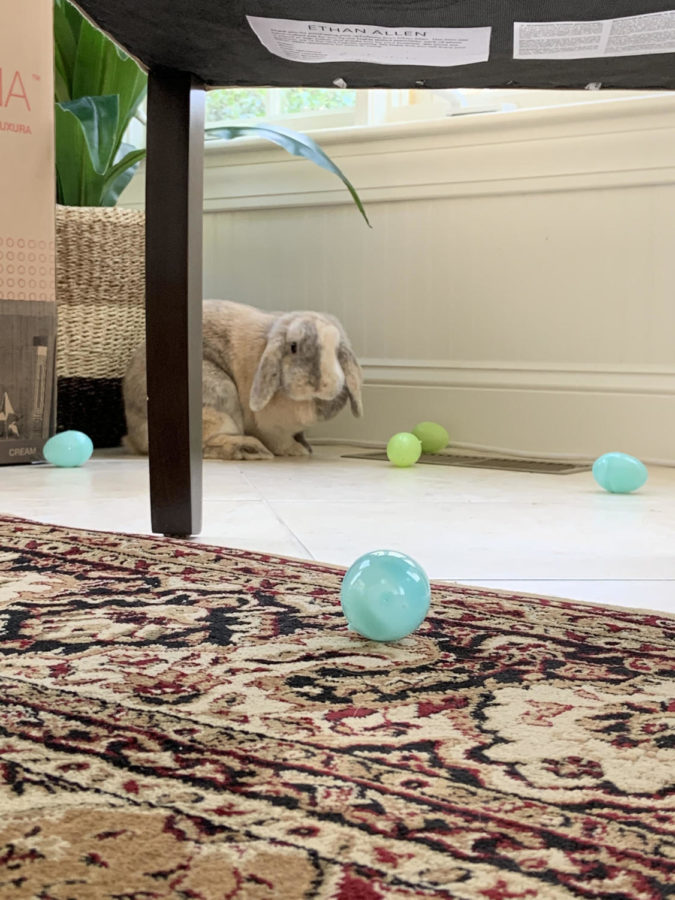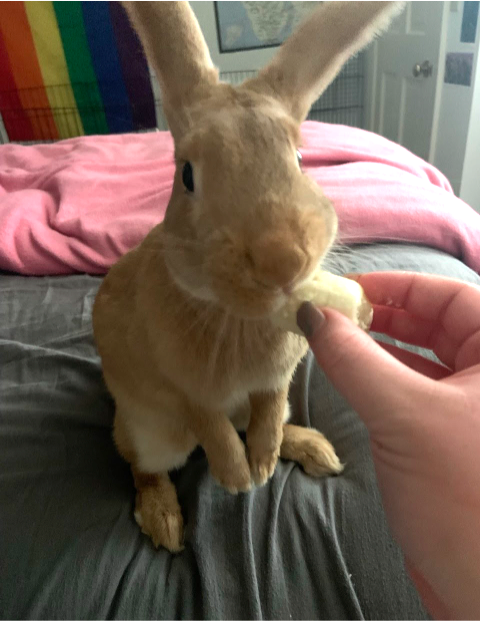Adding Some Joy to Your Day: Bunnies
Nellie, a 4-month-old rabbit, looks for a treat. She is a current House Rabbit Network foster rabbit who will be available for adoption after her spay. She is currently with a foster family in Hopkinton.
Rabbits are the third most common pet in America according to National Geographic, but require specialized veterinary care, and knowledgeable owners to live healthy, hoppy lives.
Alice was a rabbit that was surrendered to House Rabbit Network, a rabbit rescue organization, in 2021 when she and her bond-mate started fighting. She was adopted by a family in Westerly, RI.

Angela Schievert, Alice’s mom, has nothing but good things to say about her experience with Alice.
“She is my first rabbit, and I honestly never thought of having a rabbit until Alice. She is beautiful, sweet, and sassy, and I continue to learn about her astonishing intelligence, and her blooming, mischievous personality everyday,” Schievert said.
Rabbits have a fairly simple diet: 80% hay, 20% vegetables and pellets. They should have unlimited access to timothy hay and water.
Choosing the right pellets for your pet bunny can be challenging. There are many brands of pellets. However, the best ones do not include “extras” like seeds and are mostly hay.
Vegetables, herbs, and fruits are important in a rabbit’s diet to keep their sensitive digestive tract working properly. Rabbits should have fresh leafy greens daily. For treats, rabbits love bananas, broccoli, carrots, and basil, although every bunny has different likes and dislikes.
Rabbits can be litter box trained. Rabbits that have been fixed, either spayed or neutered, generally can be easily litter box trained because their hormones are no longer fluctuating. In fact, all rabbits should have a litter box, but their litter habits may be inconsistent until their spay or neuter.
To ensure a happy life, rabbits need to have plenty of space. The recommended minimum cage size for a rabbit is 4x4x4 feet. This gives them space to jump and play while ensuring that they stay in the cage. Rabbits can jump over three feet.
Rabbits can also be free roam, meaning they do not have a cage, and often have certain large areas of their home available for them.
This free-roam setup does not work for all rabbits and rabbit owners but is an option that some owners pursue. In a free roam environment, the space has to be rabbit-proofed so that the bunny can’t get into things that could harm them.
Every rabbit has their own unique personality that they exhibit through behaviors and body language.

“A bun bun may not make a peep, but they are quite opinionated! Alice is insistent on letting me know that she wants something by making a lot of noise inside her enclosure,” Schievert exclaimed.
Rabbits are known to exhibit excited behaviors. When a rabbit is excited, they may get the “zoomies” where they run in a seemingly uncontrolled manner.
Excited rabbits may also “binky.” When a rabbit is particularly happy or excited, they run fast and may jump and twist in the air.
Another unique behavior of rabbits is “chinning.” When a rabbit wants to claim something as theirs, they will rub the underside of their chin against the object. Rabbits have scent glands under their chins, so when they chin an object, they leave their scent behind.
They are intelligent. Rabbits can be trained to do various tricks, such as standing up on hind legs for a treat.
Because of their intelligence, bunnies require lots of entertainment. Luckily, they can be entertained with common household recyclables, like cardboard boxes, toilet paper rolls, and paper bags, or baby toys.
They also are master escape artists and have been known to even jump out of their four-foot pens!
“I call Alice “Houdini” since she has escaped her enclosure time after time. I have rebuilt her enclosure, changed it around after every breakout investigation, and she still seems to find a way out. Alice often makes me go on a hide and seek escapade, and she is very good at it,” Schievert said.
Rabbits shouldn’t be bathed. They have small hearts, which means changes in their environment can create life-threatening shock. When rabbits are bathed they are subjected to changing temperatures. Because of the change in temperature, some rabbits when bathed have died from shock.
Like cats, rabbits groom themselves. They do need to be regularly brushed, and they need some extra intervention, like trimming their nails and using a damp washcloth for any big messes. Rabbits even clean their own ears!
Rabbits can also form bonds with other rabbits. When rabbits bond, they need to stay together and can be found grooming each other or cuddling.
Like other species, there are many different breeds of rabbits. Some of the most common are Holland lop, Mini lop, Rex, and Californian.
Rabbits require specialized veterinary care, which can be harder to find. Many pet vets do not treat rabbits. Often, rabbit owners need to go to small animal veterinarians or exotic animal veterinarians.
Consequently, due to lack of information, pet rabbits get abandoned or surrendered. The House Rabbit Network, a non-profit rabbit rescue organization, in Billerica, MA, took in 667 pet rabbits in 2020 alone. Many rabbits were surrendered to House Rabbit Network or rescued from hoarding situations.
At HRN, when a rabbit is awaiting adoption, they are either cared for at the shelter in Billerica, or sent to live with a vetted foster home.
Fosters care for the bunny and help them socialize so they are ready for adoption. Once they are old enough and ready, HRN pays for each rabbit to be spayed or neutered. As soon as the rabbit is healthy, volunteers and fosters work together to find a suitable home for the rabbit.
HRN foster Sreya Ravi has fostered 5 rabbits. All of which were adopted. Ravi looks fondly on her experiences fostering.
“I genuinely have loved changing these bunnies’ lives. Socializing them is difficult at first, but nothing is more rewarding than when a shy rabbit becomes the playful and cuddly” Ravi said
Getting rabbits spayed or neutered, and owner education are key to stopping over-breeding, surrendering, and overpopulation of rabbits
For some bunnies that are abandoned though, there is a happy ending. Especially for HRN alumni Frank.
In January of 2021, when Frank was approximately eight weeks old, he was left abandoned in a church donation bin. Miraculously, he survived the harsh Massachusetts winter until he was found by a member of the congregation.
That congregation brought Frank to HRN. The HRN community nursed him back to health, coordinated his care with foster families, and eventually adopted out into a loving family of his own.
If you are interested in learning more about rabbits, you can visit HRN’s website at RabbitNetwork.org, or call the HRN hotline: 781-431-1211.
If you are interested in fostering or adopting a rabbit, you can call HRN and inquire at the number above, or fill out an adoption application on their website.
“It is work that truly saves these rabbits and I would encourage everyone who is able to consider fostering or adopting from a shelter,” Ravi remarked.





